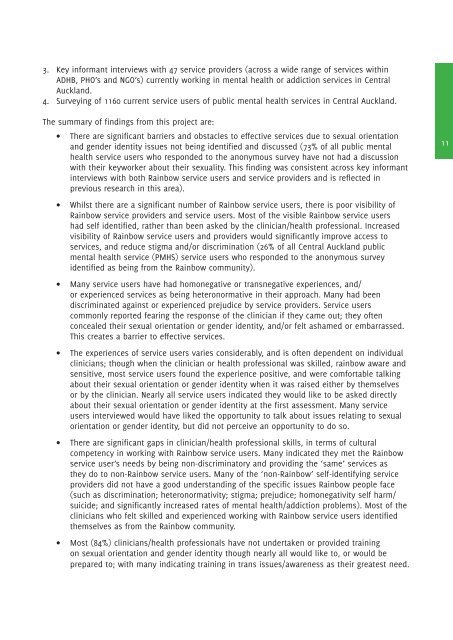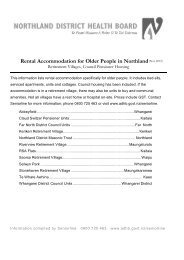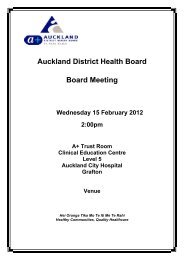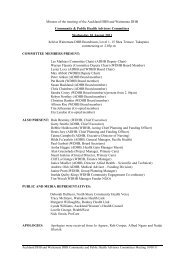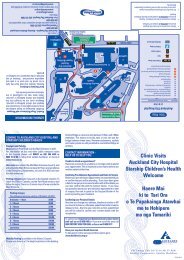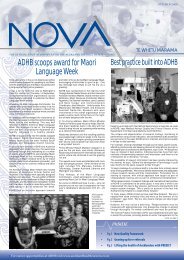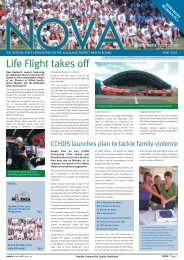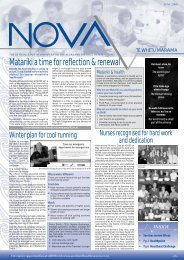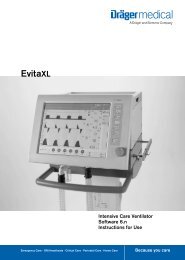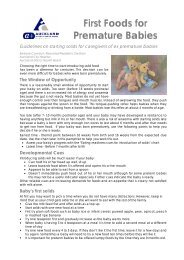Lets talk about sex.... - Auckland District Health Board
Lets talk about sex.... - Auckland District Health Board
Lets talk about sex.... - Auckland District Health Board
Create successful ePaper yourself
Turn your PDF publications into a flip-book with our unique Google optimized e-Paper software.
3. Key informant interviews with 47 service providers (across a wide range of services within<br />
ADHB, PHO’s and NGO’s) currently working in mental health or addiction services in Central<br />
<strong>Auckland</strong>.<br />
4. Surveying of 1160 current service users of public mental health services in Central <strong>Auckland</strong>.<br />
The summary of findings from this project are:<br />
• There are significant barriers and obstacles to effective services due to <strong>sex</strong>ual orientation<br />
and gender identity issues not being identified and discussed (73% of all public mental<br />
health service users who responded to the anonymous survey have not had a discussion<br />
with their keyworker <strong>about</strong> their <strong>sex</strong>uality. This finding was consistent across key informant<br />
interviews with both Rainbow service users and service providers and is reflected in<br />
previous research in this area).<br />
• Whilst there are a significant number of Rainbow service users, there is poor visibility of<br />
Rainbow service providers and service users. Most of the visible Rainbow service users<br />
had self identified, rather than been asked by the clinician/health professional. Increased<br />
visibility of Rainbow service users and providers would significantly improve access to<br />
services, and reduce stigma and/or discrimination (26% of all Central <strong>Auckland</strong> public<br />
mental health service (PMHS) service users who responded to the anonymous survey<br />
identified as being from the Rainbow community).<br />
• Many service users have had homonegative or transnegative experiences, and/<br />
or experienced services as being heteronormative in their approach. Many had been<br />
discriminated against or experienced prejudice by service providers. Service users<br />
commonly reported fearing the response of the clinician if they came out; they often<br />
concealed their <strong>sex</strong>ual orientation or gender identity, and/or felt ashamed or embarrassed.<br />
This creates a barrier to effective services.<br />
• The experiences of service users varies considerably, and is often dependent on individual<br />
clinicians; though when the clinician or health professional was skilled, rainbow aware and<br />
sensitive, most service users found the experience positive, and were comfortable <strong>talk</strong>ing<br />
<strong>about</strong> their <strong>sex</strong>ual orientation or gender identity when it was raised either by themselves<br />
or by the clinician. Nearly all service users indicated they would like to be asked directly<br />
<strong>about</strong> their <strong>sex</strong>ual orientation or gender identity at the first assessment. Many service<br />
users interviewed would have liked the opportunity to <strong>talk</strong> <strong>about</strong> issues relating to <strong>sex</strong>ual<br />
orientation or gender identity, but did not perceive an opportunity to do so.<br />
• There are significant gaps in clinician/health professional skills, in terms of cultural<br />
competency in working with Rainbow service users. Many indicated they met the Rainbow<br />
service user’s needs by being non-discriminatory and providing the ‘same’ services as<br />
they do to non-Rainbow service users. Many of the ‘non-Rainbow’ self-identifying service<br />
providers did not have a good understanding of the specific issues Rainbow people face<br />
(such as discrimination; heteronormativity; stigma; prejudice; homonegativity self harm/<br />
suicide; and significantly increased rates of mental health/addiction problems). Most of the<br />
clinicians who felt skilled and experienced working with Rainbow service users identified<br />
themselves as from the Rainbow community.<br />
• Most (84%) clinicians/health professionals have not undertaken or provided training<br />
on <strong>sex</strong>ual orientation and gender identity though nearly all would like to, or would be<br />
prepared to; with many indicating training in trans issues/awareness as their greatest need.<br />
11


